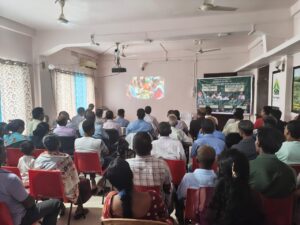The PM Jan Dhan Krishi Yojana was launched in North Tripura to boost farm productivity and double farmers’ income through technology-driven initiatives, soil improvement, efficient water use, and stronger market linkages under a five-year agricultural development plan.
The Government of India took a significant step toward strengthening the rural economy with the launch of the Prime Minister Jan Dhan Krishi Yojana (PMJDKY) in North Tripura on Saturday. The official inauguration was held at the office of the District Agriculture Officer, marking the start of an ambitious, nationwide programme designed to transform the agricultural sector and improve the livelihood of millions of farmers.
Under this flagship initiative, the government aims to enhance agricultural productivity, promote sustainable farming practices, and double farmers’ income in the coming years. The scheme will initially be implemented across 100 districts in India, covering diverse agro-climatic regions to ensure balanced and inclusive growth.
A Step Toward Modernized Agriculture
Speaking at the launch event, District Magistrate of North Tripura, Chandni Chandran, highlighted the broader vision of the PM Jan Dhan Krishi Yojana. She said the programme’s primary objective is to promote the use of modern agricultural technologies, improve crop yields, and make farmers economically self-reliant.
“Among Tripura’s eight districts, North Tripura has been selected for the implementation of this transformative scheme. The district has shown great potential in adopting scientific and sustainable farming methods,” Chandran noted.
Five-Year Technology-Driven Plan
According to senior agriculture officials present at the event, a five-year, technology-driven development plan will be formulated for North Tripura under the scheme. The plan will focus on multiple aspects of agricultural development, including:
Improvement of soil quality through scientific soil testing and nutrient management.
Modern seed and fertiliser management, ensuring farmers have access to high-yield and climate-resilient crop varieties.
Water-use efficiency with the help of micro-irrigation systems and rainwater harvesting techniques.
Expansion of market linkages to connect farmers directly with buyers, cooperatives, and agri-business firms.
These interventions aim to increase overall productivity while reducing dependence on traditional farming methods that often yield low returns.
Participation and Support from Local Authorities
The inaugural programme witnessed the active participation of several key dignitaries, including the Assistant Sabhadhipati of North Tripura Zilla Parishad, the Deputy Director of the Agriculture Department, and senior district administration officials.

A large number of farmers and agricultural experts also attended the event, reflecting strong local enthusiasm for the new scheme.
Officials emphasized that the success of PMJDKY will depend heavily on community participation, awareness programmes, and capacity-building workshops for farmers.
The district administration has planned to organize regular training sessions on smart farming practices, digital tools for crop monitoring, and efficient input management.
Expected Outcomes
The PM Jan Dhan Krishi Yojana aims to transform the agriculture sector from a subsistence-driven system to a profit-oriented, technology-backed industry. The expected benefits include:
Enhanced soil fertility and resource management.
Increased agricultural output and farm income.
Strengthened market connectivity for better price realization.
Adoption of sustainable and climate-smart agricultural techniques.
The North Tripura administration expressed confidence that the district’s inclusion in the scheme will pave the way for holistic rural development and serve as a model for other districts in the northeastern region.
| Also Read: Tripura CM inaugurates Rs 33 cr ADB-Funded MBB College Lake |
With strong institutional support, modern technology, and dedicated farmer involvement, the PM Jan Dhan Krishi Yojana is expected to bring a paradigm shift in India’s agricultural landscape—turning small and marginal farmers into empowered contributors to the nation’s economy.













